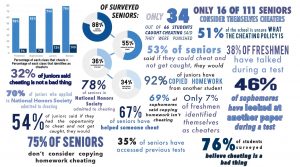By Andrea Traietti and Christian Carr-Locke
Lead Writer and Staff Writer
The Rebellion sent a poll about cheating and academic integrity to the Walpole High School student population. The survey closed with 297 respondents (25 percent of total school population); the statistical analysis provided in this article reflects information established by this number of students.
INEFFECTIVE POLICY
In the survey recently conducted by The Rebellion, 70 percent of respondents admitted that they have cheated or actively cheat. Even in National Honor Society, a program that prides itself on academic and moral integrity, a shocking 78 percent of respondents admit to partaking in some sort of cheating. In actuality, academic dishonesty at Walpole High has gotten out of hand: students have moved on from simply glancing at others’ tests and have begun exploiting technology to get perfect grades. Common types of cheating include taking pictures of tests from one class period and sending it to other students in later class periods, distributing tests received from upperclassmen who already have all the answers and even simply looking up answers on cell phones during the test. This widespread crisis of academic dishonesty is a direct result of Walpole High’s current policy on cheating and the culture it promotes within the school. The fact that administration has not made attempts to reevaluate the policy even after last year’s valedictorian plagiarized her entire speech has further stressed the tolerance of cheating at Walpole High.
Walpole High’s current cheating policy treats cheating as a behavioral issue — not an academic one. There is a wide variety of punishments for students who cheat; however, nowhere in the handbook does it state that a student who cheats will receive a zero on the assignment, even though that should be the logical consequence for a student who participates in some form of academic dishonesty.
Few students know the specifics of the cheating policy. In fact, students are rather unaware of the policy: only 50 percent of survey respondents said that they know what the policy is. The lack of knowledge regarding cheating is due mainly to the ambiguity of the school’s policy. For example, the WHS Student Handbook states that for a first offense of cheating, “the administration will record the incident in the school data system and apply consequences.” But what are the consequences? Administration has intentionally enacted a loose policy in order to judge each cheating offense on a personal level so that students who cheat will face appropriate punishments. Consequently, this creates trouble because not only do students lack a solid understanding of the repercussions of their actions, but teachers are also unsure of how they should treat specific offenses that occur in their classrooms. For example, out of the survey respondents who said they had been caught cheating, only 52 percent said they had to face some sort of punishment. Overall, the policy has instituted a culture of tolerance and acceptance at WHS, as no students are nervous about receiving punishments for cheating, and teachers won’t bring concerns about academic integrity to the attention of administration because even the teachers don’t know what the results of that action will be.
CULTURE OF CHEATERS
Students and teachers alike have fallen into a safe pattern when it comes to cheating.
While teachers feel the need to tolerate cheating, students have actually started promoting it. The promotion of cheating is due mainly in part to modern technology and the peer pressure of group text settings. In many classes, students form group chats with their friends or classmates and use these groups to send out homework answers or quiz questions. There is a lot of pressure to be an active participant in these messages, and failure to send out your answers usually gets you labeled as a “hardo” who cares too much about school.
Though some students feel peer pressure, the majority of consistent cheaters are motivated simply by the idea that by cheating, they can get good grades without putting any time or effort into their schoolwork. There is actually a willingness and even a desire to cheat. For example, roughly 53 percent of juniors and seniors answered that if they had an opportunity to cheat without being caught, they would do so. Interestingly, fewer freshmen and sophomores—44 percent of survey respondents—said they would cheat if given the opportunity to do so without being caught. According to the statistics, the willingness to cheat increases with grade, indicating that students become more comfortable with the idea of academic dishonesty as they progress through high school. The only logical explanation for this promotion of cheating is the culture that the school policy promotes.
According to the survey, 75 percent of students agreed that cheating is a bad thing, even though many of those same students said they had cheated. This coincides perfectly with the acceptance of cheating: students are only told that it is wrong, but, again due to the policy, they don’t have a solid understanding of why. To them, cheating is a low-risk, high-reward endeavor.
Evidently, it isn’t hard to cheat at Walpole High: out of 211 students who said they had cheated, only 66 students said they were caught. But the fact that cheating is easy doesn’t give students a free pass to scam their way through quiz after quiz and test after test. So ultimately, why is cheating wrong? Cheating is nothing other than the act of taking advantage — taking advantage of teachers, other students, and dishonest academic resources. Cheating not only diminishes the effort of hard-working, honorable students, but it indicates that students lack respect for their teachers, their peers, their educations, and themselves.
Whether the blame for the lack of moral enlightenment falls on a too-relaxed policy or those whose responsibility it is to instill a sense of integrity in students, it is time that the cheating issue at Walpole High is addressed. Ultimately, the cheating problem must be handled in a manner that directs focus towards a community based off of integrity and hard work. The only way to fully reconstruct a culture of academic integrity at Walpole High is through a stricter policy (and a consistent enforcement of this policy) so that students can learn to value and respect academic honesty.
MOVING FORWARD
The perplexing thing about the cheating epidemic is the fact that this cheating cycle starts and ends at the same place: the policy. While the lax cheating policy has created a school culture that accepts and even promotes cheating, the adjustment of this policy is the only way to rebuild academic integrity within the school environment.
It’s not hard to accept the fact that the school’s policy needs reform, but what kind of policy changes would be enough to make a difference? First, the policy must clearly define cheating and it should be consistently enforced. There cannot be any gray area as to what the school defines as cheating. Currently, the Walpole High School Student Handbook has a thorough list of responses that correlate with the number of cheating offenses a particular student has committed. This could potentially be an effective way to handle the situation, but the school needs to adjust the punishments required for each offense. Students should receive a zero for the first time they cheat and every consequent time they cheat. On further offenses, these students should face additional punishments such as detentions and even suspensions. No, a suspension is not too severe. Students who cheat repetitively are repetitively stealing from other students, and these students should face an accordingly severe punishment. This policy adjustment would effectively dissuade students from cheating, and it could also make students reevaluate their educational integrity.
Additionally, the policy change must give teachers the power to punish students how they find fit without having to go through higher administration. Teachers must assume the power that is enumerated in the Student Handbook and dictate consequences that they believe can end negative behavior in the classroom if they are going to end the normal standard that promotes comfort in cheating for students.
IMPACTING MORALITY
The transition to a more serious policy should not be just to punish those who get caught cheating, but it should help instill into the WHS student body the morals behind academic integrity. A stricter policy (and therefore stricter punishment) would send the message that cheating is not to be accepted in the Walpole High community. Ultimately, the goal of the policy should be to make students understand that cheating is wrong because it is immoral, not because they will be punished for doing it. There needs to be a greater appreciation for academic honesty. Students need to respect their teachers, their peers, and their own learning abilities. Only through a transition in policy and a subsequent appreciation for academic integrity could WHS foster an environment conducive to honest and fair learning.















Ryan services • Jan 18, 2017 at 7:02 am
Excellent work.